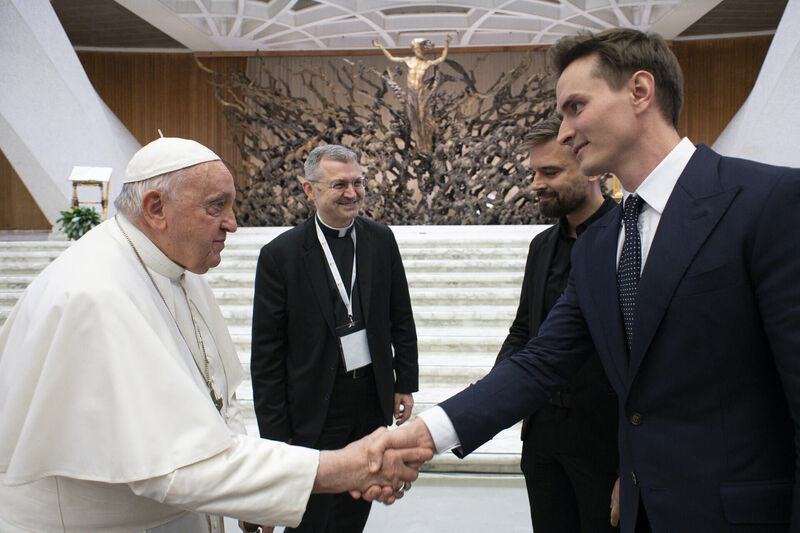A Polish tech entrepreneur has launched “Code with Pope”, a global project in cooperation with the Vatican to help children around the world, and especially in Catholic countries, to learn computer programming.
Miron Mironiuk, the young businessman behind the scheme, says he hopes it can help address “the glaring disparities in education” around the world.
Last month, Mironiuk (pictured above) inaugurated the project at an audience with Pope Francis, reports Poland’s Catholic News Agency (KAI). A pilot programme had already been launched the previous month at schools in four Polish municipalities in cooperation with Poland’s digital affairs ministry.
Franciszek zachęca dzieci do nauki programowania. "Koduj z papieżem" https://t.co/qqgDq2B3H0
— Onet Wiadomości (@OnetWiadomosci) October 25, 2023
Through “Code with Pope”, children aged 11 to 15 will gain access to a free online learning platform. The 60-hour course will be available in Spanish, English, Italian and Polish and provide a foundation of knowledge of Python, one of the world’s most popular programming languages.
“This is a great opportunity for children to be able to successfully compete on the market in the future,” Mironiuk told KAI.
“Poles have always been guided by the principles of solidarity, helping those who need help most at a given moment,” he added. “[Code with Pope] can help equalise opportunities for children from excluded regions.”
Last week, the firm he founded, Cosmose, announced that children from the Philippines, Nepal, Ghana and El Salvador, among others, have already starting learning through the scheme.
“I myself owe a lot to public education and now I want to give something from myself,” the entrepreneur added in an interview with Polish newspaper Gazeta Wyborcza.
“Not everyone will be a programmer, but every school graduate, girls and boys alike, should know the basics of programming, because it is a 21st-century skill, just like reading, writing or counting,” he added.
Speaking to the BBC, Mironiuk said that he hoped the Catholic church’s endorsement would help bring the programme to a wider audience, though he joked that he “doesn’t expect the pope to know Python very well”.
In a 2015 interview, Francis admitted that he is “a disaster with machines. I don’t know how to work a computer”.
A Polish game studio is launching the world's first Jesus simulator, which will allow players to perform miracles, help the needy and battle Satan https://t.co/Py0smGhB8d
— Notes from Poland 🇵🇱 (@notesfrompoland) November 17, 2022
In 2014, while in his mid-20s, Mironiuk founded the Singapore-based Cosmose AI, a technology company integrating offline retail and online advertising that has since worked with brands such as Cartier, LVMH and L’Oreal.
Earlier this year, the firm was valued at $500 million, reported Nikkei Asia. Mironiuk himself was named in 2018 as one of Forbes magazine’s “30 Under 30” in the “Asia – Media, Marketing & Advertising” category.
Poland has itself become a growing destination for large tech firms, with Visa, Volvo, Microsoft and Google among those to recently establish offices there, citing the availability of local tech talent as a big draw.
However, in 2021, a report found that Poland has a shortfall of around 50,000 IT specialists, with that figure predicted to rise to 100,000 over the next decade.
Visa has announced the creation of a global technology and product hub – its fifth such facility in the world – in Poland, creating 1,500 specialist jobs.
"Poland has highly qualified employees and a thriving IT sector,” says the firm https://t.co/1KjngNP7tU
— Notes from Poland 🇵🇱 (@notesfrompoland) May 23, 2023

Notes from Poland is run by a small editorial team and published by an independent, non-profit foundation that is funded through donations from our readers. We cannot do what we do without your support.
Main image credit: Cosmose, Inc./LinkedIn

Agata Pyka is a former assistant editor at Notes from Poland. She specialises in Central and Eastern European affairs, cybersecurity, and investigative reporting. She holds a master’s degree in political communication from the University of Amsterdam, and her work has appeared in Euractiv, the Balkan Investigative Reporting Network (BIRN), and The European Correspondent, among others.



















